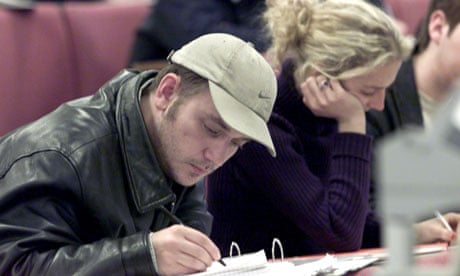The time university students spend in direct contact with lecturers has fallen over the past year, with the sharpest decreases in medicine and engineering, according to new research. The data also show a fall in the number of first-year undergraduates rating their courses as excellent.
The biggest decrease in teaching hours was at institutions in the Russell Group of universities, where the average time spent in tuition or lectures fell from 15.6 hours a week to 14.7 last year, according to a survey for the National Union of Students. The Russell Group comprises 20 of the UK's top research universities.
The research highlights the pinch on universities, which face deep cuts in state funding but are coming under greater pressure to deliver a better experience for undergraduates ahead of the rise in fees next year.
The two most intensive courses saw the biggest decline in contact time. Medical and dental students received just over 20 hours of teaching last year, compared with an average of 22.6 the year before. Engineering students received 16.5 hours of teaching compared with 19.6 in 2009. Across all institutions, average weekly hours of tuition and lectures fell from 14 in 2009 to 13.4 last year.
In Scotland, where universities face a 10% cut in teaching budgets, Glasgow is proposing to drop several modern languages courses and merge history with archaeology and classics.
Amy Mackinnon, a third-year student of Russian at Glasgow, said: "Glasgow is the only university in Scotland to offer Polish and Czech and one of only three to offer Russian. Their closure at the university will leave Scotland less capable of playing an international role at this time of European integration."
Glasgow argues that the proposed cuts will allow the university to "strategically prioritise" its activities.
England's universities will have their teaching budgets cut by 4% to £4.3bn over the next academic year.
The NUS survey, published this week, also shows that the proportion of first-year students rating their experience as excellent has halved, from 28% in 2009 to 14% last year. But overall satisfaction with the quality of teaching is high.
Russell Group students still receive the highest number of contact hours with tutors and lecturers compared with other universities. At the million+ group of newer universities, which includes Roehampton and Coventry, students received an average of 12.4 hours teaching last year.
The research, conducted by GfK Financial for the NUS and HSBC, involved just over 3,800 students.
NUS president Aaron Porter said: "These results indicate a significant step backwards in terms of students' learning experience at university, particularly for those in their first year. The increase in fees makes it even more vital that this trend is reversed, students must not be made to pay more for less. We need to see an urgent formal review of the experience of first-year students to ensure they are given the kind of experience that they deserve."
"The massive cuts to university funding might tempt universities to further cut contact time and staff-to-student ratios but they must not let these standards decline any further."
Dr Wendy Piatt, director-general of the Russell Group, which includes Oxford and Cambridge, argued that Britain's most competitive universities continue to provide an ideal learning environment with a connection to leading thinkers and access to first-rate libraries.
"However, Russell Group universities are finding it increasingly difficult to maintain a high-quality learning environment and high student satisfaction rates, particularly in light of spending cuts," she added. "The indicative cuts to teaching funding for 2012-13 highlight just how important recent parliamentary votes were in providing essential funding to replace these losses, albeit via increased fees and graduate contributions. Without that income, it would have been impossible to maintain the world-class quality of our courses.
"Maintaining the highest levels of student satisfaction and the lowest drop-out rates is extremely important to us. Our priority is to ensure students are able to develop intellectually and socially, and are in a strong position to succeed in a very competitive job market."
Oxford and Cambridge indicated last week that they were likely to charge students £9,000 a year, the maximum allowed, from 2012. Students can borrow the full cost from the government upfront and do not have to make repayments until they graduate and are earning at least £21,000 a year.
